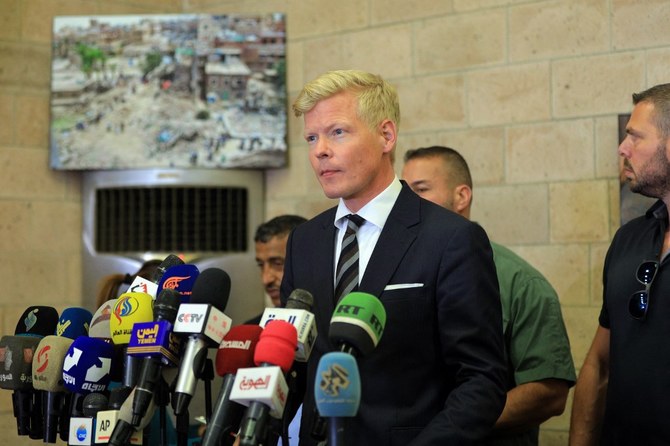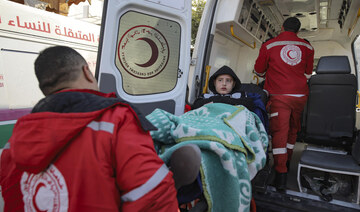NEW YORK: The Houthis must lift their siege of Taiz to allow millions of suffering residents to access vital humanitarian assistance, healthcare and economic opportunities, Hans Grundberg, the special envoy for Yemen, urged Tuesday.
Speaking at a UN Security Council meeting on Yemen, Grundberg said this action must be taken, even as he welcomed the fact that the truce has held between the Yemeni government and the Iran-backed group.
The ceasefire has seen a drastic reduction in hostilities and civilian casualties, allowed the resumption of civilian flights from the long-shuttered Sanaa airport, and facilitated the flow of fuel into Hodeidah port.
Grundberg said the Houthis must now gradually open the roads leading into the city. Taiz governorate has been under siege since 2015, when the group closed main routes and surrounded the city center, largely cutting it off from the rest of the country.
“It is critical that this truce can also deliver on easing the suffering of the people of Taiz,” Grundberg told the Security Council.
“For years, (Taizis’) freedom of movement has been greatly impeded by this conflict. As Taizis know all too well, the only open roads to the city are long and arduous,” said Grundberg. The Swedish diplomat told the council he had personally travelled for over six hours “along the narrow, winding, and rugged mountainous road from Aden to the city of Taiz. Before the conflict, the same trip on the main road would have only taken three hours.”
“In Taiz, I met with men, women, and youth, who told me about their daily plights caused by the closure of access roads in and out of the city. I have also witnessed first-hand how the severe restrictions have crippled the economy, worsened access to healthcare, and endangered travel of civilians.”
The UN has proposed a phased opening of the roads around Taiz. It includes a main route eastward from Taiz city to the Hawban area, as well as additional roads to and from other governorates. The proposal includes measures to ensure the safety of civilian travelers.
“While I am encouraged by the positive response by the Government of Yemen to the UN proposal, I am still waiting for a response from Ansar Allah,” Grundberg said.
In response to Arab News’ questions after the meeting, Grundberg said he wants to urge the Houthis to respond.
“If you consider the fact that seven years have gone and we have not seen a resolution, but only several attempts (to solve the problem) of Taiz, I think that the fact that we have been waiting for six days since the proposal was presented to them is within that context not a long time.
“But since we are within the framework of 60 days of truce, every day that goes by is particularly long. So this just highlights the fact that this is not an easy matter to solve. But I encourage all the parties, including Ansar Allah to make as speedy a progress on this issue as possible.”
Addressing the Security Council for the first time in person since the truce took effect on April 2, which was later extended to Aug. 2, Grundberg said that the ceasefire continues to hold as there have been no airstrikes inside Yemen nor cross-border attacks launched from it since the beginning of the agreement.
There has also been a significant reduction in civilian casualties, although Grundberg lamented the fact that lives were still being lost to landmines and unexploded ordinance as civilians ventured into contaminated frontline areas that were previously inaccessible to them.
Despite the overall reduction in hostilities, however, Grundberg said that violations continue with armed clashes occurring on several fronts especially in Marib, Taiz and Hodeidah governorates.
“As you are aware, we do not have independent monitoring capacities, but I take these allegations very seriously,” said Grundberg. “It is critical to prevent such alleged incidents from provoking a spiral of renewed escalations and violence.”
Grundberg also convened the first two meetings of the Military Coordination Committee, with representatives from parties and the Coalition’s Joint Forces Command. The committee had agreed to meet regularly, he added.
“The face-to face meetings represent a significant first step towards building trust and improving communication between the parties,” he said.
Since the truce began, several commercial flights have left Sanaa airport which had been closed for six years. Around 3,000 passengers have been transported to Amman and Cairo, seeking medical treatment and reconnection with family members.
Grundberg noted the country’s government “prioritizing the needs of Yemenis” by facilitating the opening of the airport, and also reiterated his “sincere appreciation to the Arab Republic of Egypt, the Hashemite Kingdom of Jordan and the Kingdom of Saudi Arabia for their instrumental roles in facilitating the flights.”
The steady flow of fuel to Hodeidah port has continued throughout the truce, he said. During the months of April and May, over 480,000 metric tons of fuel products were cleared, “more fuel than entered Hodeidah during the whole of last year.”
“The steady delivery of fuel has taken the pressure off vital services, significantly decreased queues at petrol stations that dominated Sanaa’s streets, and has allowed Yemenis to travel more easily throughout the country,” he said.
Lana Nusseibeh, the UAE’s permanent representative to the UN, called on Grundberg to intensify efforts to open Taiz’s main road, and not only secondary ones, “to alleviate the suffering of millions living under siege.”
She said that despite the truce the Houthis continue to mobilize and recruit across their areas of control, “indoctrinating children with extremist ideology.”
Nusseibeh, along with other council members, commended Saudi Arabia for contributing $10 million toward the UN-backed salvage operation on the decaying supertanker Safer.
US ambassador Linda Thomas-Greenfield said there was now “a cause for genuine optimism” as the truce holds, and that building on this progress will be a central focus of President Joe Biden’s visit to the region next month.
Asked by Arab News whether he shares the optimism that the truce will develop into a permanent solution for the seven-year conflict, Grundberg said he was adopting a cautious approach.
“I try to take one step at a time and not rush too quickly, but also make sure that all steps that are taken are done and implemented in a consolidated manner. What we are seeing right now are steps that have been unprecedented that we have not seen during the last seven years and that is absolutely something that we should welcome.
“But then there is absolutely more to do, more effort to be done. Therefore, we want to continue to encourage all parties on all of the issues and hope that we can take the necessary steps forward.”

























